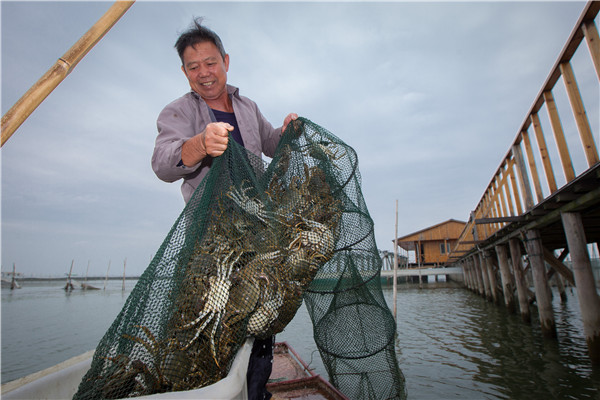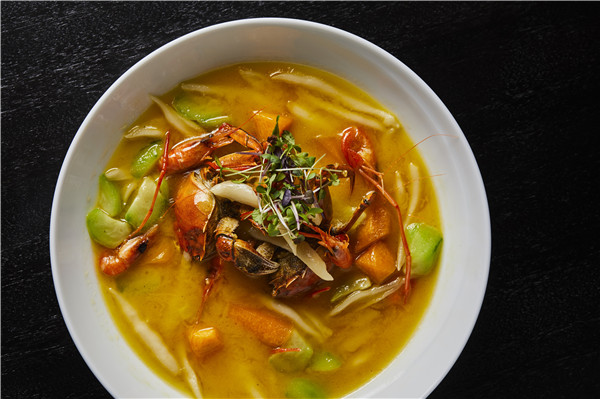
From the People's Daily App.
This is Story in the Story.
Heated bidding for freshly caught fish has always been an exciting part of the annual winter fishing festival at Chagan Lake, northeast China's Jilin Province.
This year, the largest bighead carp caught in the first net was sold for nearly three million yuan, or more than $400,000.
The auction price has increased more than tenfold in the past decade. And it's not just for the biggest catch, as overall sales of the lake's fish have been increasing year by year.
While China's normal freshwater fish market continues to weaken, the price and demand for Chagan Lake fish remains strong.
Zhang Wenping, deputy director of the Chagan Lake fish farm said sales speed and volume now are higher than the same period last year. "If Chagan Lake fish could be sold as fast as now, 1,500 tons of output this year can be sold out by Spring Festival," he speculated.
Today’s Story in the Story looks at the growing appetite in China for fish and crustacean delicacies.

A crab farmer from Cheng Long Hang, a company whose Huangpu branch restaurant got a Michelin star this year, harvests hairy crabs from Taihu Lake in East China's Jiangsu province. (Photo: China Daily)
Many come by the lake every winter to shop for a lucky bighead carp as a lunar new year's gift for friends and relatives, wishing for a good start. The grand winter fishing celebration, along with local folklore about ancient customs being handed on, reinforces the cultural roots of the fish and makes them widely known.
Meanwhile, the fish farm manager believes the quality of the fish also matters as they meet the increasing desire for organic food. This means the fish in the lake have become widely coveted.
And in recent years, with the emergence of e-commerce websites in China such as JD.com and Tmall, the majority of the fish are being sent directly to consumers across the country.
The number of e-commerce retailers of Chagan Lake fish has mushroomed from two to over 20, accounting for 70 percent of total sales last year. And they are set to play an even bigger part in the future.
"In the beginning there were only small fish weighing two kilograms for online sales. But since last year, we have begun to sell bigger ones of over 10 kilograms to meet growing market demands," Zhang Wenping added.
Each winter, Mongolian fishermen brave temperatures of -20 to -30 degrees Celsius and use a centuries-old technique to catch fish.
And because the old fishing method is very time-consuming, each fishing crew can only cast their net once a day.
Braised hairy crab and shrimp with dough ball in sour soup from Maison on One. (Photo: China Daily)
As the fishing season goes on, fishermen will slowly approach the center of the lake where the highest number of fish are typically caught.
At the same time, thanks to a mild summer and optimal breeding methods, both the amount and quality of hairy crabs, a freshwater crustacean farmed mostly in East China's Yangtze River region, have reached historical highs.
According to the China Fisheries Association, the total volume of hairy crabs produced this year should reach 850,000 metric tons, up by more than 10 percent from last year.
Dubbed the man who "fished diamonds out of water," Yang Weilong, a senior engineer of aquaculture and consultant of China Fisheries Association, has been largely responsible for turning the famous hairy crabs produced in Yangcheng Lake into a national brand.
"The hairy crab, after decades of improved breeding and marketing efforts, stands out as the epitome of China's refined taste and culinary skills due to its unique characteristics and historical background," he says.
Many dining establishments that specialize only in hairy crabs have also spawned over the years. One such example is Cheng Long Hang, a high-end restaurant chain from Shanghai that specializes in hairy crabs.
"As a Chinese food producer, all we need to do is to make sure the quality and taste of hairy crabs don't deteriorate. Who knows? We might even see these crabs end up on dining tables around the world in the future, placed alongside the likes of oysters and lobsters," said the chain's founder Ke Wei, a native of East China's Fujian province.
(Produced by Nancy Yan Xu, Brian Lowe, Lance Crayon and Paris Yelu Xu. Music by: bensound.com. Text from CGTN and China Daily.)


